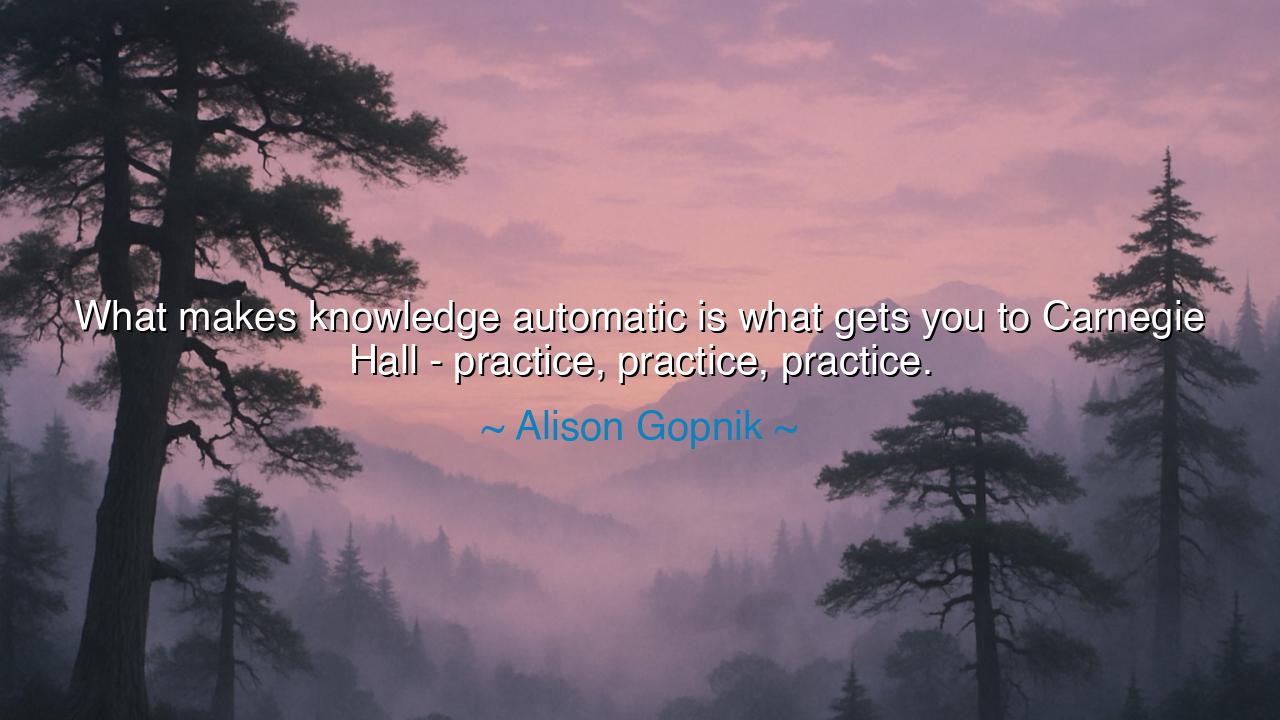
What makes knowledge automatic is what gets you to Carnegie Hall
What makes knowledge automatic is what gets you to Carnegie Hall - practice, practice, practice.






In the radiant words of Alison Gopnik, the philosopher of the mind and the scholar of childhood, there resounds an ancient truth dressed in modern wit: “What makes knowledge automatic is what gets you to Carnegie Hall — practice, practice, practice.” Within this saying lies both the humility and the triumph of learning — the understanding that knowledge, no matter how profound or intricate, is never born whole but shaped through repetition, perseverance, and patience. Gopnik, a scientist of cognition, speaks not merely of skill but of transformation — for practice does more than train the hands or the tongue; it engraves wisdom into the marrow of one’s being.
The origin of this quote draws from a famous anecdote that has echoed through generations of artists and dreamers. A young musician once asked a passerby in New York, “How do I get to Carnegie Hall?” The man, perhaps a violinist himself, smiled and replied, “Practice.” The humor of the story hides its depth — for Carnegie Hall, the grand stage of mastery, symbolizes the summit of human achievement, and the path to it is paved not with brilliance alone but with disciplined effort. Gopnik, in her reflection, wove this saying into her teaching on the nature of learning, reminding us that the brain, like the soul, is shaped by repetition. Automatic knowledge — the effortless fluency of mastery — is not a gift but a result, born of countless hours of deliberate striving.
Throughout history, the same truth has been whispered by the wise. Aristotle said that “we are what we repeatedly do,” and therefore excellence is not an act but a habit. Leonardo da Vinci, whose genius dazzled the world, once confessed that his skill was forged by tireless repetition — painting, sketching, studying nature until his mind and hand moved as one. And in the Eastern traditions, the sages of Zen taught that enlightenment itself is reached not by sudden revelation but by continual practice — the slow polishing of the spirit through mindful labor. Whether in art, science, or the path of virtue, mastery blooms only from the soil of persistence.
Consider the story of Yo-Yo Ma, the great cellist whose music has touched the hearts of millions. From childhood, he practiced relentlessly — not merely to perfect his sound but to merge himself with the instrument. He once said that true musicianship begins when the player disappears, and the music plays itself. This is what Gopnik means by knowledge becoming automatic — the point at which effort transforms into instinct, when the conscious mind no longer struggles but flows. The fingers, the thoughts, the heart — all move together, not by command but by harmony. The artist no longer plays the song; the song plays the artist.
But this truth extends far beyond music or art. In every field — from science to craftsmanship, from leadership to compassion — practice is the bridge between ignorance and wisdom. The surgeon’s steady hand, the poet’s graceful phrasing, the athlete’s poised movement — all are the fruits of repetition made sacred. Even kindness, that most spiritual of human virtues, grows through practice. One learns to forgive by forgiving, to listen by listening, to love by loving again and again, even when it is difficult. Thus, practice is not a mechanical act but a spiritual discipline — the deliberate shaping of the soul through constancy.
The meaning of Gopnik’s teaching is clear: genius is not a flame that descends from the heavens, but a spark that must be fanned through labor. In the modern world, where speed is worshiped and mastery expected overnight, her words remind us of the ancient rhythm of growth. Knowledge must be repeated until it becomes instinctive, until it breathes within us like a second nature. When the dancer practices her steps, when the craftsman repeats his strokes, when the scholar revisits his texts — they are not merely rehearsing, they are transforming. Every repetition is a prayer to the gods of wisdom, saying: “Let this truth become part of me.”
The lesson we must take is as practical as it is profound. Do not despise the slow path, for it is the only path. Every master was once an apprentice, every sage once a seeker fumbling in the dark. Let your practice be your temple — a place where discipline meets devotion. Whatever you pursue — the pen, the tool, the word, or the dream — return to it daily, patiently, with reverence. In time, your effort will cease to feel like labor and will become expression. What once required focus will flow effortlessly, as breathing does to the body. And when that day comes, you will know what it means for knowledge to become automatic — not mechanical, but alive within you, pulsing with the rhythm of your heart.
So let the words of Alison Gopnik ring as a teaching for all generations: greatness is not a mystery, nor is wisdom a miracle. They are the result of practice, practice, practice — the sacred repetition through which the human spirit learns to transcend itself. For only through the discipline of doing does knowing become being, and only through constancy does the ordinary hand become the hand of a master. In this way, every act of practice becomes a pilgrimage, and every repetition a step toward your own Carnegie Hall — the place where your effort and your essence finally become one.






AAdministratorAdministrator
Welcome, honored guests. Please leave a comment, we will respond soon